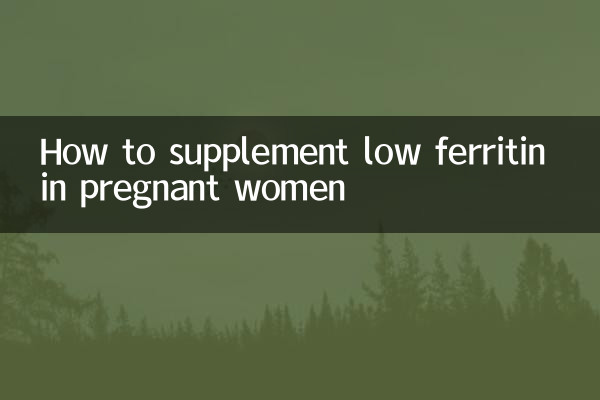A hotly debated health topic on the Internet recently is the issue of nutritional supplements for pregnant women, especially when ferritin levels are low. Ferritin is an important indicator of iron storage in the body. Low ferritin in pregnant women may cause anemia and affect fetal development and maternal health. This article will provide detailed structured data and practical suggestions around this hot topic.
Reasons for low ferritin in pregnant women
Low ferritin in pregnant women is usually due to insufficient iron intake, malabsorption, or increased requirements. The expansion of blood volume and fetal development during pregnancy increase the demand for iron significantly. If not supplemented in time, it can easily lead to iron deficiency. The following is an analysis of common causes:

| reason | illustrate |
|---|---|
| Inadequate dietary iron intake | No increased intake of iron-rich foods during pregnancy |
| iron malabsorption | Reduced stomach acid or intestinal disease that affects iron absorption |
| Increase in demand | Fetal development and blood volume expansion lead to increased iron requirements |
How to tell if ferritin is low
Common symptoms of low ferritin in pregnant women include fatigue, dizziness, paleness, palpitations, etc. Confirmation requires a blood test. The following are relevant indicators:
| index | normal range | Low ferritin level |
|---|---|---|
| Serum ferritin | 15-200ng/mL | <15ng/mL |
| hemoglobin | 11.5-15.5 g/dL | <11 g/dL (possible anemia) |
Supplementary methods for pregnant women with low ferritin
Ferritin supplementation requires both diet and medication. The following are specific additional suggestions:
1. Dietary supplements
Foods rich in iron are divided into heme iron and non-heme iron. Heme iron mainly comes from animal foods and has a higher absorption rate; non-heme iron comes from plant foods and has a lower absorption rate. Here is a list of iron-rich foods:
| food type | food examples | Iron content (per 100 grams) |
|---|---|---|
| heme iron | Red meat (beef, lamb), liver, fish | 2-5 mg |
| nonheme iron | Spinach, beans, nuts, whole grains | 1-3 mg |
In order to improve the absorption rate of iron, it is recommended to eat it with vitamin C-rich foods (such as citrus and tomatoes) and avoid taking it at the same time as calcium or caffeine.
2. Medication refills
If dietary supplementation is insufficient, your doctor may recommend taking iron supplements. Here are common iron supplement types and usage recommendations:
| Iron type | Representative medicine | Dosage recommendations |
|---|---|---|
| ferrous sulfate | Fonade, Philippe | 30-60 mg elemental iron daily |
| polysaccharide iron complex | Li Feineng | 150-300 mg daily |
Constipation or melena may occur as side effects when taking iron supplements. It is recommended to start with a small dose and gradually increase it, and drink more water and eat more fiber foods.
3. Lifestyle adjustments
In addition to diet and medications, pregnant women should also pay attention to the following points:
Summarize
Low ferritin in pregnant women is a problem that needs attention. Timely supplementation of iron can effectively prevent anemia and fetal dysplasia. With proper diet, medication supplements, and lifestyle adjustments, ferritin levels can return to normal in most pregnant women. If symptoms persist or worsen, you should seek medical advice promptly and seek professional guidance.

check the details

check the details